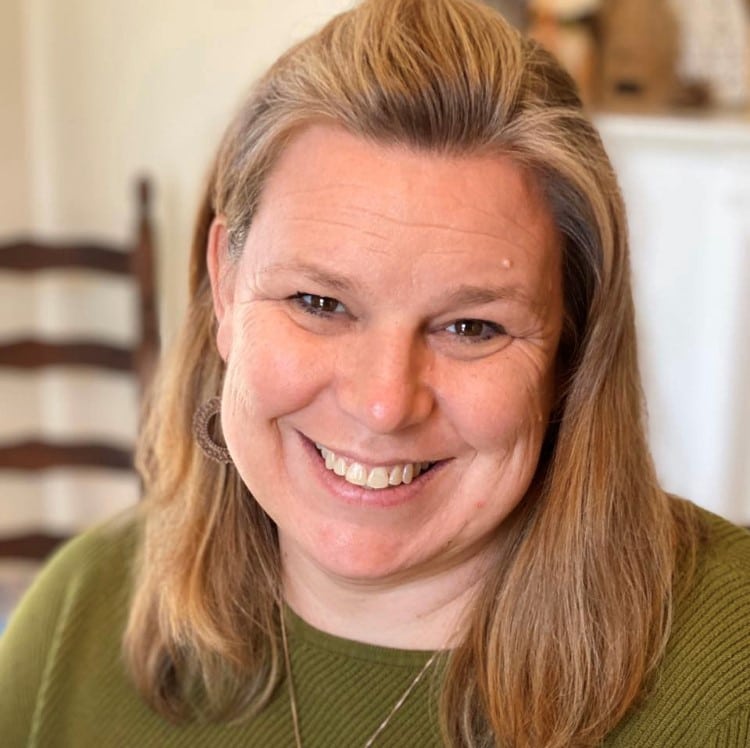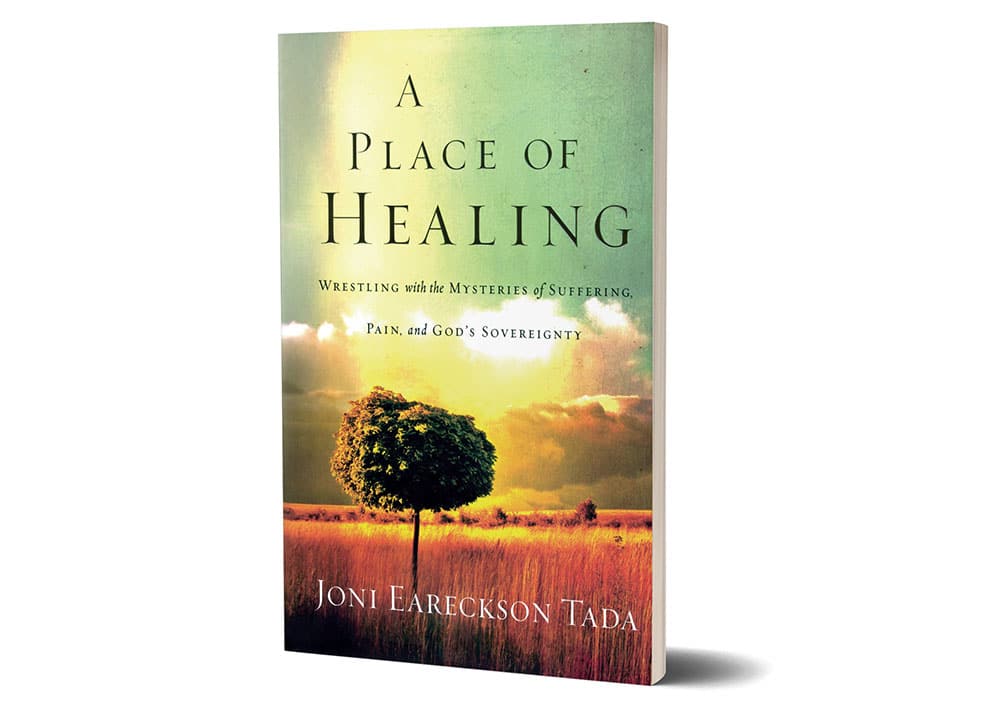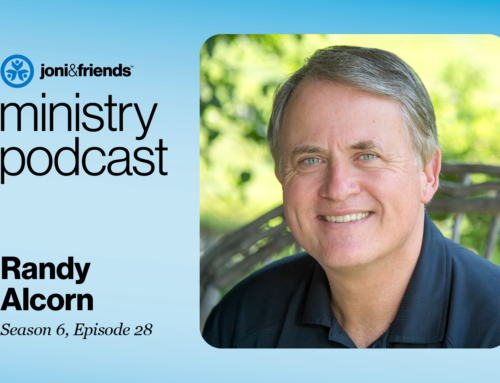Spiritual Abuse
Subscribe to the Joni and Friends Ministry Podcast

Do you know someone who has been wounded by coercion, spiritual shaming, or misuse of Scripture?
Author and Christian counselor Darby Strickland previously joined the podcast to share about caring for people who have suffered from trauma and abuse.
In this episode, she returns to talk about spiritual abuse.
Tune in to learn the markers of spiritual abuse, how spiritual abuse can hurt people with disabilities in particular, and what can be done for a person wounded by coercive control, manipulative spiritual teaching, or other forms of spiritual oppression.
What is spiritual abuse?
“Spiritual abuse is coercively controlling or condemning another individual.”
Darby Strickland
Darby explains that spiritual abuse can take many forms—in homes, in churches, and in communities—and can include misuse of doctrine, Scripture, or religious authority. Sadly, she says, spiritual abuse is crafty, and therefore can be hard to detect, especially for those caught in its web.
In Christian circles, Darby says, all too frequently husbands practice spiritual abuse, using teachings about submission and obedience to dominate and coercively control their wives and families. This can lead to domestic violence, sexual abuse, and other kinds of damaging and toxic patterns.
Parents can also wield power over children in inappropriate ways, using shame and force (even citing Scripture) to produce particular behaviors instead of shepherding a child’s heart with love.
Darby says: “Oftentimes you are being spiritually oppressed and you don’t even know what’s happening because the things that are being distorted have a little bit of truth in them, or they have a scriptural address to them. And so it’s very challenging to untangle that it’s abuse or that there’s even damage happening.
I think it’s also important to point out that sometimes the spiritual abuser doesn’t know he’s abusing. Because they’re using truths to keep power. They oftentimes believe what they’re promoting and teaching.”
What are signs of spiritual abuse?
Whether it occurs in the home or in a spiritual community, Darby identifies common markers of spiritual abuse (this list is representative and not meant to be complete):
- Shame: People suffering from spiritual abuse tend to be “filled with shame.”
- Sense of unworthiness: “They tend to feel undeserving of God’s love.”
- Fixation on one’s own sin: “They’ve been taught that their sin is the cause of their suffering.”
- Fear of questioning the leader or spiritual authority: “Good leaders and teachers welcome questions.”
- “If you’re afraid to disagree with somebody, that tends to be a sign.”
How can people with disabilities be especially vulnerable to spiritual abuse?
Darby shares how people living with disability can face heightened exposure to some forms of spiritual abuse.
“For one, they tend to be more dependent and vulnerable. They [may be] in a relationship where there’s a caregiver and it’s not safe to terminate their relationship with them. They also tend to be limited in their exposure, sometimes due to mobility, or have barriers to creating community. So when you have a toxic relationship or a toxic community, it’s harder to extract yourself and find a new one.”
Beyond practical difficulties, people with disabilities are often deeply suffering and seeking answers. This can pave the way for manipulative, controlling people or ministries to swoop in claiming to have the answers. With intrusive healing ministries, for instance, a person with a disability may hear, “Follow my teachings, do these things, and you’re going to be healed.”
As Joni discusses in her book A Place of Healing, people with disabilities may hear “You’re in sin or you would be healed,” from an intrusive healing ministry. “I find this to be most tragic,” says Darby.
For these people, what they’re hearing is a message of shame, which obscures who God really is. They are left feeling confused, unworthy, and cut off from God.
What can be done to help and heal people wounded by spiritual abuse?
For those seeking to bring healing and relief to people who have suffered (or continue to suffer) from spiritual abuse, Darby provides advice:
Take time to learn how the person has been hurt.
Particularly if you have never experienced spiritual abuse, Darby advises caution and gentleness when approaching topics related to faith and church.
As she says: “You want to understand what has been used to harm or control them. How has the abuse shaped that person’s experience of Christians in general, which will affect how they see you, or the church, or marriage, or people in authority? What is it like for them to pick up and read their Bible?… Do they feel like their Bible’s yelling at them?… How are they experiencing God?
Just get a sense for what’s it like for them. It is going to be so different for you who go to church and [experience] grace and love and care received from the Lord. You’re not going to have a similar experience. You need to spend time and slow down and figure out what’s it like for them…”
Recognize that the spiritually abused person is going to fear you (or the church and Christian community) harming them.
“Christian communities probably will feel scary to them, so you need to be thoughtful and wise about how they should engage in their church or small groups or Bible study…
Many abuse victims fear church. Communion is particularly difficult. Sermons, fellowship—to them, it all just feels like danger. So we need to be really careful and tender with them in that.”
Darby
Be mindful and patient when helping people who suffer from ongoing harm.
“It’s really hard, if not impossible for people to heal when their abuse is ongoing.”
Bear with the person’s potential reactivity and emotional responses.
“A person who has suffered abuse is in so much pain and so tender; even a shadow or a remnant hurts. And they tend to have tender consciences… and great grief and conviction.”
Trust God’s pace and timing… the healing journey is long.
“It’s going to be a glorious unfolding. [Trusting God’s timing] will let you do things slower and be more tender… Trusting God with them just allows us to work at a different pace.”
“By sharing their story, they’re exposing their shame.”
“This is worship and it is glorious. Sometimes it’s going to sound messy and it might sound like anger. But anger is actually a good development because they now understand the harm that has been done to them. And God is angry about these things, and we see Jesus angry about these things… We trust that God is going to shape their anger into lament.”
Get clear about the cause of suffering in human life.
“Most people have a theology of suffering that is very one-dimensional—that suffering is a result of sin. And really, we have to live recognizing that suffering is a result of the fall. And living in this fallen world, suffering comes to us on many fronts, and sometimes that’s other people’s sin.”
Offer people Jesus’s invitation to rest.
Darby envisions people going to church free to think of themselves as weary, languishing souls, walking in the doors to find rest, replenishment, and healing. The church needs to tend to people’s hearts the way Jesus would—”pursuing their hearts gently and graciously.”
“Come to me, all you who are weary and burdened, and I will give you rest. Take my yoke upon you and learn from me, for I am gentle and humble in heart, and you will find rest for your souls. For my yoke is easy and my burden is light.”
Matthew 11:28–30
“I will refresh the weary and satisfy the faint.”
Jeremiah 31:25
Find help if you are suffering from spiritual abuse…
If you are suffering from abuse, Darby offers the first steps you can take to find safety and healing:
- Find a safe person to talk to and share your story.
- If you are suffering because of a pervasive teaching in your church, find a person of faith from outside.
- If you are experiencing abuse in your family, find a person who is outside the abusive system.
- Ask questions about what you have been told.
- Assess teachings and instruction based on the totality of Scripture and the character of God.
“Really the way out is finding a safe place to heal your story, where it will be treasured and the questions will be honored.”
Darby

A Place of Healing
“If God can heal me, why won’t he?” Joni Eareckson Tada takes you with her on an intimate journey through foundational questions about healing, suffering, pain, and hope.








